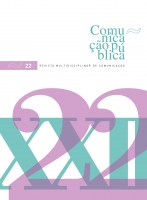The development of the journalistic discourse in Portugal – A case study of Madeira regional press of early 20th century
DOI:
https://doi.org/10.4000/cp.1398Keywords:
journalism history, discourse, regional portuguese press, I World War, objectivityAbstract
European reluctance to adopt the Anglo-American discursive standard of journalism had for consequence that the incorporation of the new journalistic discourse had different rates of implementation reflecting distinct evolutions.
In this paper, we contribute to a historical and comparative study of the Portuguese journalistic discourse through the case study of two Madeira’s regional newspapers in the second decade of the 20th century - Diário de Notícias (Madeira) and Diário da Madeira - by the time of the bombing of Funchal in 1916 and 1917 by German submarines during World War I. Fundamentally, the study is about a genealogy of the discursive practices of regional and insular Portuguese journalism.
The paper concludes that, although Madeira’s journalism manifest, in small notes, this influence, the basic principles of the Anglo-American discursive pattern of journalism were not completely developed. Objectivity, inverted pyramid and neutral journalistic voice seem not to be yet key elements of journalistic discourse at the time of the bombings of Funchal. Instead, in the newspapers tends to predominate a kind of discourse close to that characteristic of an opinion press.
Downloads
References
Baptista, C. (2012). Apogeu, Morte e Ressurreição da Política nos Jornais Portugueses – do Século XIX ao Marcelismo. Lisboa: Escrit’orio.
Barros, J.L. de (2014). O Jornalismo Político Republicano Radical. O Mundo (1900-1907). Tese de Doutoramento em História, Faculdade Ciências Sociais e Humanas, Universidade Nova de Lisboa.
Barros, J.L.de (2015). O jornalismo político d’O Século e do Diário de Notícias. Comunicação Pública, 10 (17). DOI : 10.4000/cp.928
Broersma, M. (2007). Form, style and journalistic strategies. An introduction. In: Broersma, M. (ed.). Form and Style in Journalism. European Newspaper and the Representation of News, 1880-2005. Leuven: Peters: ix-xxix.
Cádima, F. R. (2002). História e Crítica da Comunicação. Lisboa: Edições Século XXI.
Carvalho, E.S. (2013). Jornalismo de Guerra- O Caso da Imprensa Portuguesa. Dissertação de Mestrado, Universidade da Beira Interior.
Chalaby, J.K. (1996). Journalism as an Anglo-American invention – a comparison of the developments of French and Anglo-American journalism, 1830s-1920s. European Journal of Communication, 11(3): 303-326. DOI : 10.1177/0267323196011003002
Chalaby, J.K. (1998). The Invention of Journalism. London: Palgrave Macmillan. DOI : 10.1057/9780230376175
Hallin, D. and Macini, P. (2004). Comparing Media Systems. Cambridge: Cambridge University Press. DOI : 10.1017/CBO9780511790867
Joesphi, B. (2005). Journalism in the global age: Between the normative and empirical. Gazette: The International Journal for Communication Studies, 67 (6): 575-590.
McLaughlin, G. (2002). The War Correspondent. Londres: Pluto Press.
Matheson, D. (2000). The birth of news discourse: changes in news language in British newspapers, 1880-1930. Media, Culture & Society, 22: 557-573.
Melo, P.B (2005). Um passeio pelo história da imprensa: o espaço público dos grunhidos ao ciberespaço. Revista Comunicação & Informação, 8 (1).
Mesquita, M. (2003). O Quarto Equívoco. O Poder dos Media na Sociedade Contemporânea. Coimbra: MinervaCoimbra.
Mónica, M.F. (2003). Eça de Queiroz Jornalista. Lisboa: Principia.
Novais, N.E. (2013). A Imprensa Portuguesa e a Guerra. 1914-1918- Os Jornais Intervencionistas e Anti-Intervencionistas, a Acção da Censura e da Propaganda. Tese de Doutoramento em Ciências da Comunicação, FCSH-NOVA.
Papathanassopouolos, S. (2001). Media commercialization and journalism in Greece. European Journal of Communication, 16: 505-521. DOI : 10.1177/0267323101016004004
Queirós, Eça de (1983). Correspondência. In: Castilho, Guilherme de (Org.). Lisboa: Imprensa Nacional – Casa da Moeda.
Sardica, J. M. (2012). O poder visível: D. Carlos, a imprensa e a opinião pública no final da monarquia constitucional. Análise Social, 203, XLVII (2.º): 344-368.
Serrão, J. (1983). Temas de Cultura Portuguesa. Lisboa: Livros Horizonte.
Sousa, J.P. (S/D). Uma história breve do jornalismo no ocidente. BOCC. [Internet] Disponível em <http://www.bocc.ubi.pt/pag/sousa-jorge-pedro-uma-historia-breve-do-jornalismo-no-ocidente.pdf> [Consult. Julho de 2016].
Sousa.J.P. (S/D). Pesquisa e reflexão sobre jornalismo até 1950: a institucionalização do jornalismo como campo de conhecimento e campo científico. [Internet] Disponível em <http://www.bocc.ubi.pt/pag/sousa-jorge-pedro-pesquisa-e-reflexao-sobre-jornalismo-1950.pdf> [Consult. Outubro de 2016].
Stephens, M. (1988). The History of News. New York: Viking.
Stephens, M. (1997). History of Newspapers. Collier’s Encyclopedia.
Tengarrinha, J. (1971). História da Imprensa Periódica Portuguesa. Lisboa: Portugália editora.
Thomson, E.A., White, P.R.R. e Kitley, P. (2008). Objectivity and hard news reporting across cultures. Journalism Studies, 9 (2): 212-228.
Tunstall, J. (1977). The Media are American. London: Constable.
Williams, K. (2006). Competing models of journalism? Anglo-American and European reporting in the information age. Journalistica, 2: 43-65. DOI : 10.7146/journalistica.v1i2.1788
Downloads
Published
Issue
Section
License
Copyright (c) 2017 Direitos do Autor (c) 2017

This work is licensed under a Creative Commons Attribution-NonCommercial 4.0 International License.
Os conteúdos da Comunicação Pública estão licenciados com uma licença Creative Commons - Atribuição-NãoComercial 4.0 Internacional.


